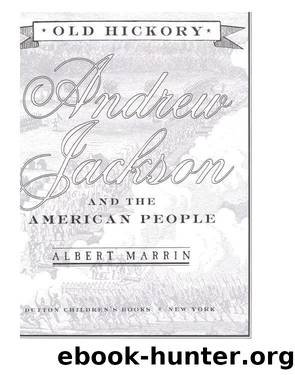Old Hickory by Albert Marrin

Author:Albert Marrin
Language: eng
Format: epub
Publisher: Penguin Young Readers Group
In 1823, Washington, D.C., bore little resemblance to the city we now know. When Thomas Jefferson dubbed it âthat Indian swamp in the wilderness,â few challenged his description. Although it had thirty-nine thousand inhabitants, enslaved people included, in many ways it was still just a frontier town set in the marshes along the Potomac River. The unfinished Capitol sat on a hilltop, in a clearing hemmed in by trees and brush. Bored congressmen would slip away to shoot birds, rabbits, and squirrels on its grounds. In the distance, the shaft of the Washington Monument, also unfinished, rose amid a jumble of storage sheds and marble blocks.10
Wide avenues nearly empty of houses stretched to the horizon. In the heat of summer, their unpaved gutters turned to deserts of swirling sand and powdered horse manure. In winter, gutters became muddy streams. âThe mud,â a visitor noted in 1819, âis so frightful that one sinks down above the ankles.â Fine carriages let elegant ladies out in quagmires; many walked barefoot to keep from soiling their shoes. Mosquitoes rose in clouds from the foul marshes, and cockroaches scurried about. Mounds of trash stank to high heaven, food for the pigs roaming Pennsylvania Avenue. Known simply as âThe Avenue,â it was the cityâs main thoroughfare, connecting the Capitol and the White House. A brick sidewalk ran along its west side. A streamâreally an open sewerâflowed down Capitol Hill and ran along its east side, right past the White House.11
Most government officials lived in boardinghouses on or near The Avenue. Usually they âmessedââate and drankâtogether for companionship and to share expenses. Washington was a drinkerâs town, alcohol coming in endless varieties from raw corn whiskey to the finest French champagne. At night, men gathered around silver punch bowls described by a visitor as being âlarge as a Roman bathing tub,â discussing the dayâs events. At the boardinghouse where the justices of the Supreme Court stayed, boarders voted to drink only in wet weather, to preserve their health. Chief Justice John Marshall, hardly a wild lad, could not do without his wine. Informed that the sun was shining brightly, Marshall would say, âAll the better; for ... it [is] certain that it must be raining somewhere.â Fill the glasses!12
Senator Jackson took in the sights. He had not been to Washington since the fall of 1819, when Congress debated his invasion of Florida. Again he visited the Capitol, the nerve center of government. Besides the House of Representatives and Senate, this building held the Library of Congress and the Supreme Court chamberâin the basement. In the House, representatives sat at their desks answering letters, dozing, or chatting with neighbors. Now and then someone called out âMr. Speaker! Mr. Speaker!â to raise a question or ask permission to reply to a speech. Yet the acoustics were so bad that hardly anyone heard anything clearly. No matter. Speakers droned on, chiefly to have their words printed, at public expense, and sent home, also at public expense, to show voters what a fine job they were doing.
Download
This site does not store any files on its server. We only index and link to content provided by other sites. Please contact the content providers to delete copyright contents if any and email us, we'll remove relevant links or contents immediately.
Harry Potter: A Journey Through a History of Magic by British Library(386)
The Science of Philip Pullman's His Dark Materials by Mary Gribbin(365)
The Basics of Organic Chemistry by Clowes Martin;(358)
Harry Potter and the Sorcerer's Stone: SparkNotes Literature Guide by SparkNotes(328)
Braiding Sweetgrass for Young Adults by Robin Wall Kimmerer(308)
Flowers in the Gutter by K. R. Gaddy(298)
Super Simple Chemistry by D.K. Publishing(289)
Summary of the Selfish Gene by Readtrepreneur Publishing(288)
JavaScript Coding for Teens: A Beginner's Guide to Developing Websites and Games by Yueh Andrew(282)
Exam Success in Geography for IGCSE & O Level by Unknown(277)
The Python Audio Cookbook;Recipes for Audio Scripting with Python by Alexandros Drymonitis(264)
Dark days in Salem: the witchcraft trials by Deborah Kent(263)
Analysis and Linear Algebra for Finance: Part II by Bookboon.com(257)
Key Immigration Laws by Kathryn Ohnaka(253)
Cracking the AP Economics Macro & Micro Exams, 2017 Edition by Princeton Review(244)
Solutions for a Cleaner, Greener Planet: Environmental Chemistry by Marc Zimmer(241)
Reverse Engineering For Everyone! by mytechnotalent(233)
The Science of Fashion by Julie Danneberg;(229)
Cracking the AP Psychology Exam, 2017 Edition by Princeton Review(218)
